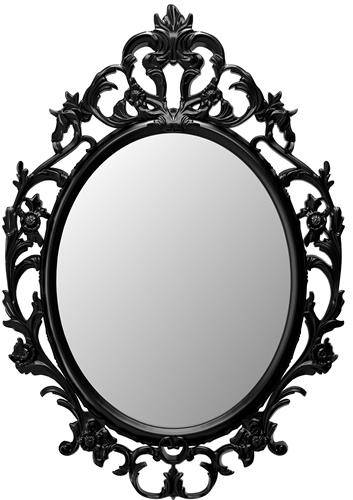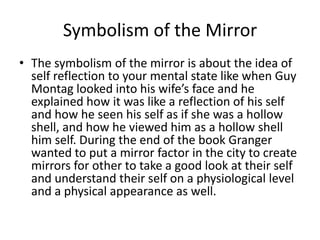Mirrors in “Fahrenheit 451” symbolize self-reflection and awareness. They prompt characters to examine their actions and thoughts.
Ray Bradbury’s “Fahrenheit 451” is rich in symbolism. One of the most intriguing symbols is the mirror. Mirrors often appear in the story, urging characters to confront their true selves. In a society where books are banned and critical thinking is discouraged, mirrors represent the rare moments of introspection.
They challenge characters to recognize their roles in their dystopian world. This theme of self-awareness through mirrors is key to understanding the deeper messages in “Fahrenheit 451”. Bradbury uses mirrors to highlight the importance of self-examination in a conformist society. Through this symbol, readers are invited to reflect on their own lives and the world around them.

Credit: www.emaze.com
Mirrors In Fahrenheit 451
Mirrors play a key role in Fahrenheit 451. They symbolize self-reflection. The characters use mirrors to see their true selves. Mirrors help them understand their inner thoughts and feelings.
Mirrors represent the idea of self-awareness. Seeing yourself in a mirror can make you think. It can make you change. In the story, mirrors are a tool for personal growth.

Credit: www.slideshare.net
Reflection Of Self
In Fahrenheit 451, mirrors show how characters see themselves. Montag starts to see his true self in the mirror. At first, he is a fireman who burns books. He thinks his job is good. But as he looks deeper, he sees he is not happy. He begins to change. He starts to question his life and society. The mirror reflects his inner change. He sees himself as someone who wants to learn and grow. This transformation is key to the story.
Montag’s inner conflict grows as he sees his reflection. The mirror shows his struggle. He feels torn between his old life and new thoughts. The mirror forces him to face his fears. He sees the truth about his world. This causes him pain but also pushes him to act. The mirror is a powerful symbol of his inner fight. It helps him understand who he really is.
Mirrors And Society
Mirrors in “Fahrenheit 451” show a deep social critique. They help people see their true selves. Society in the book avoids self-reflection. People are afraid to face their reality. They prefer to conform and blend in with others. This leads to a loss of individuality and critical thinking. The book uses mirrors to show the importance of self-awareness. It urges people to look inside and think deeply.
Conformity is a big issue in “Fahrenheit 451”. People follow the rules without question. They fear being different. Mirrors symbolize the need to break free from this. Seeing oneself in a mirror can be a wake-up call. It challenges the status quo and promotes individuality. The book shows that true change starts with self-reflection.

Credit: slideplayer.com
Mirrors As Truth Bearers
Mirrors in Fahrenheit 451 symbolize self-awareness and truth. They reflect the inner self, revealing hidden thoughts and emotions. Montag realizes his true identity through the mirror, sparking his journey to self-discovery.
Revelation Scenes
Mirrors show the truth about characters in Fahrenheit 451. They help characters see their real selves. When Montag looks at himself, he sees the changes in him. He realizes he does not like what he sees. This is a turning point for him.
Character Realizations
Characters look in mirrors and understand their lives. Montag sees his unhappiness. He starts to question his world. Clarisse also uses a mirror. She sees a different life. These moments are key for their growth.
Mirrors And Memory
Mirrors in “Fahrenheit 451” often represent self-examination. Characters look at themselves to remember who they were. This act can be painful but is necessary for growth. Montag, the main character, uses mirrors to reflect on his past actions. This helps him understand his true self.
Mirrors also evoke nostalgia. They help characters recall happy memories. These memories contrast with their current lives. The reflections offer a glimpse into a better past. This longing for the past fuels their desire for change. Nostalgia becomes a powerful force in their journey. Mirrors, thus, serve as windows to lost joy and hope.
Mirrors In Literature
Mirrors have been used in stories for many years. They often show truth and self-reflection. In the past, mirrors were rare and valuable. People thought they held mystical powers. Mirrors also appear in ancient myths and fairy tales. They reflect the inner self and hidden truths. This makes them powerful symbols in literature.
Mirrors in “Fahrenheit 451” symbolize self-awareness. Characters look into mirrors and see their true selves. This often leads to self-discovery. In other books, mirrors can mean different things. For example, in “Alice in Wonderland,” mirrors lead to a fantasy world. In “Snow White,” the mirror shows vanity and jealousy. The use of mirrors varies, but they always reflect deeper meanings.
Symbolic Characters
Clarisse is a young girl who loves to ask questions. She makes Montag think about his life. Clarisse acts like a mirror. She shows Montag his true self. This scares him at first. But it also helps him change. Clarisse’s curiosity and love for life are her mirrors. They reflect the world as it could be.
Beatty is Montag’s boss. He hates books and the ideas they bring. For Beatty, mirrors are dangerous. They make people see their flaws. Beatty believes mirrors can cause trouble. He thinks people should not look too closely at themselves. Beatty’s view is very different from Clarisse’s. He fears the truth that mirrors show.
Frequently Asked Questions
What Do Mirrors Represent In Fahrenheit 451?
In “Fahrenheit 451,” mirrors symbolize self-examination and reflection. They encourage characters to look at themselves honestly.
Why Are Mirrors Important In The Novel?
Mirrors in the novel highlight the importance of self-awareness. They push characters to confront their true selves.
How Do Mirrors Impact Montag’s Journey?
Mirrors help Montag realize his flaws. They play a crucial role in his transformation and self-discovery.
Are Mirrors A Recurring Motif In Fahrenheit 451?
Yes, mirrors are a recurring motif. They consistently represent introspection and the search for truth.
Conclusion
Mirrors in Fahrenheit 451 symbolize self-reflection and understanding. Montag’s journey shows this clearly. He starts to see his true self. This change helps him question society. Mirrors encourage characters to think deeply. They see their flaws and strengths. This reflection leads to growth.
It is crucial in the story. Mirrors remind us to look within. Self-awareness can bring change. Reflecting helps us understand our actions. It leads to a better world. So, mirrors in the novel are powerful symbols. They teach us to know ourselves.
And to seek truth always.

My name is Carson Mackey and I specialize in mirror/glass. With over 8 years of experience in the glass/mirror industry, I am well-versed in all aspects of fabrication, repair and installation. I take great pride in providing my clients with the best quality of service and products. I am passionate about my work and strive to help my clients realize their vision.
Honestly, I am dedicated to providing the best services and products to my customers and I’m always open to learning new techniques and working with advanced materials. Basically, this is a place where I will share my thoughts and experiences on Mirror. And this website (http://mirrortopics.com) is an outlet of my deep passion for Mirror.
I want to clear about MirrorTopics that it’s not any agent or hired organization. It fully customize by me. So I hope, posted information will Realistic and authentic. Although I will do enough research before posting but if you notice any wrong or mistake on my article, please contact with me without any hesitation. As well as you can suggest me about content quality, authentication and so on by using our Contact US page. Thank you my friend to support me.
